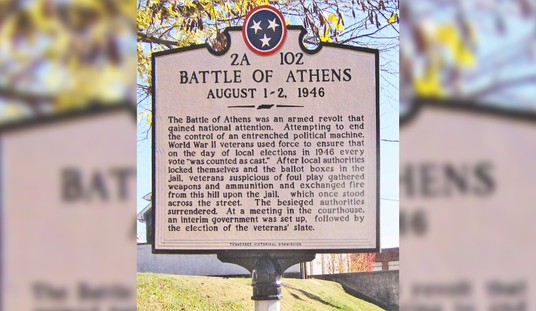It feels good to support your president even if you didn’t vote for him, and this is one of those moments. The biggest flaw in President Obama’s new strategy for Afghanistan is the text he used to deliver it, not the actual substance.
Obama announced that he’d be sending 30,000 more soldiers to Afghanistan, bringing the total number of American forces there to over 100,000. This is less than the 40,000 requested by General McChrystal. Given McChrystal’s record and the stakes in Afghanistan, adopting his recommendations was the obvious answer to the problems our efforts have been facing, and many critics became frustrated that it took President Obama several months to come around to that same conclusion.
Obama addressed this criticism by saying, “Now, let me be clear: there has never been an option before me that called for troop deployments before 2010, so there has been no delay or denial of resources necessary for the conduct of the war during this review period.” If the president’s critics want to continue to argue that his delay in making a decision was leaving our troops more vulnerable, they better be able to show that a plan was given to him to send troops before next year that was therefore jeopardized. Likewise, if the president wants to claim that the previous administration denied requests from its commanders in Afghanistan for more troops, it should provide the documents to prove so, as former Secretary of Defense Donald Rumsfeld has demanded.
Obama, faced with anti-war sentiment from the left and a desire to show his reluctance to send any more soldiers than absolutely necessary, made a smart political move in sending only 30,000 soldiers while pushing our allies to send in their own reinforcements to make up the difference. NATO’s secretary-general has already announced that the alliance will send in 5,000 more soldiers and said, “I would expect a few thousand on top of that.” This immediately brings the troop total to almost the level McChrystal said he needed. The key question now is if our allies will allow those additional soldiers to be used effectively without burdensome restraints, a problem we’ve faced in the past.
President Obama has chosen the right leaders to implement the right strategy. Unfortunately, his speech did not explain at all how the strategy has changed, aside from a brief mentioning of using the soldiers to “secure key population centers” and help build reliable Afghan security forces. There was no mentioning of how this would be done differently than in the past or bring different results, or what benchmarks would be set to assess progress, as had been insisted upon by Democrats in order to fund a similar surge in Iraq. To Americans who have not closely followed the leaks about the new strategy, they are only hearing that more soldiers will be sent to fight for the same cause in the same way with hopefully different results. These omissions will result in less public support for the plan than otherwise could be obtained.
Another key part of the strategy is that American soldiers will begin coming home from Afghanistan in July 2011. Given the success of the surge in Iraq under much worse circumstances, this isn’t an unreasonable goal — and it is just that: a goal, not a date set in stone. Unlike the withdrawal from Iraq, the departure date is not required by a status of forces agreement signed with the host country’s elected government at their insistence, and Obama has only set a date for when a withdrawal must begin, not finish. Secretary of Defense Bob Gates is already leaving the door open to modifying that date depending upon a review in December 2010, and if circumstances prohibit a safe withdrawal from happening, President Obama will adjust just like he did with his promise to close Guantanamo Bay.
Senator McCain and others are supportive of the war-fighting strategy that has been chosen, but are against the timetable attached to it. They are correct in that it will make Afghans considering joining the security forces or defecting from the Taliban think twice and they are right that any withdrawal must be consistent with the goal of securing the country. President Obama’s speech should have gone further in making clear that the U.S. would never allow the Taliban or al-Qaeda to establish a safe haven and that the populations of Afghanistan and Pakistan should place their bets on the side of us and their governments.
The downsides of that element of the strategy do not mean that upsides do not exist or that some sort of goal based on a date isn’t necessary. As President Obama stated, it gives a sense of urgency to the efforts of the U.S., its allies, and the Afghans. It helps combat propaganda that we intend to stay as imperialists. And we need to face the fact that obtaining public support in the U.S. for this strategy is an absolutely critical part of succeeding. Absent such a timetable, American support for the war would decrease faster once casualties inevitably climb as contact with the enemy increases. Patience will run out and Congress will be under pressure to cut off funding for the effort absent such a timetable, sparking an even bigger, more compromising political battle inside the U.S. just as we saw with Iraq.
News articles about the declining support for the war will frighten Afghans and comfort the enemy even more than the establishment of a timeline that, again, could potentially be adjusted. Of course, ideally no timeline would exist, but winning the political side of this conflict requires putting forth some sort of date. President Obama would have been better to attach such dates to benchmarks to assess progress in the conflict, just as his predecessor did to placate Congress and delay the time when they cut off funding unless a firm timetable was established. But this move is likely to minimize opposition from Congress that could inhibit the war effort.
Predictably left unsaid in the speech was that, ironically, the war in Iraq is going to be partially responsible for our success in Afghanistan. Without the war in Iraq, we may not have General Petraeus and McChrystal leading the new effort. We wouldn’t have the lessons from our mistakes in Iraq, or the lessons from our correcting of those mistakes with the surge, to apply to Afghanistan. We may not even have the hope that Afghanistan could be turned around if the situation in Iraq hadn’t been altered so dramatically in our favor. This doesn’t necessarily reflect on the debate over whether the war in Iraq was the right move or not, but when the “war of necessity” is won, it will be done with the experience gained from our successes and failures in the so-called “war of choice.”









Join the conversation as a VIP Member